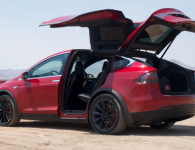
Not a week seems to go by without news of yet another fleet of delivery robots taking to the streets or hitting the grounds of a college campus.
The latest educational establishment to welcome the wheel-based delivery robots is Purdue University in Lafayette, Indiana.
From this week, its 43,000 students and staff will be able to use a smartphone app to order food and drinks for delivery to anywhere on the campus within minutes. Just don’t all order at once.
Purdue University’s robot is the work of Starship Technologies, one of the leaders in the field of autonomous delivery bots. Thirty of them have been deployed on the campus, with deliveries costing customers $1.99 a time.
How it works
Anyone on campus wishing to have food delivered begins the process by diving into the Starship Deliveries app to view the available menus. After making a selection, it’s simply a case of dropping a pin on the map to indicate the delivery point. When the robot sets off, its precise location can be tracked in real time, a process likely to have hungry students and staff salivating messily as the bot trundles ever closer.
When the robot arrives, an alert is sent to the customer’s phone, whereupon they can meet the robot, unlock the container, and access their meal. According to Purdue, the container can hold items weighing up to 20 pounds — that’s one heck of a lunch if you fill it to capacity … though you could always place an order with friends, too.
Beth McCuskey, Purdue’s vice provost for student life, said the university was excited to see the technology come to its campus. “Food delivery apps are becoming increasingly popular with college students,” she said, adding, “This service adds more options and flexibility for our campus diners.”
Starship Technologies … and others
San Francisco-based Starship Technologies launched in 2014 and is trialing its delivery robot at an increasing number of locations around the world. Rather like autonomous cars, the robot uses a combination of machine learning, artificial intelligence, and sensors for safe and accurate movement. For extra security, a team of humans can be used to monitor their progress remotely and even take control, if required.
But it’s not the only company creating such a robot. Amazon, Postmates, and FedEx are all testing their own designs for last-mile deliveries to customers’ homes, while another firm has added a twist by creating packs of “robodogs” to deliver items.
One of the biggest challenges facing developers of the technology is getting regulatory approval from city officials, some of whom believe the robots may compromise street safety.
With that hurdle remaining, a number of companies, Starship among them, have decided for now to take their delivery robots to enclosed spaces — like college campuses — where it’s easier to get clearance and which offer a safer, more controlled environment for continued development of the technology.
- Autonomous robot deliveries are coming to 100 university campuses in the U.S.
- The Rev-1 delivery robot is fast enough to hit the bike lane
- This futuristic driverless pod will soon be delivering pizza in Texas
read more at https://www.digitaltrends.com by Trevor Mogg
Tech









